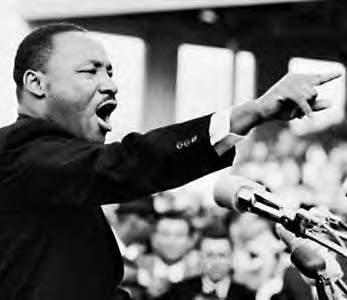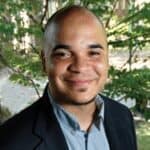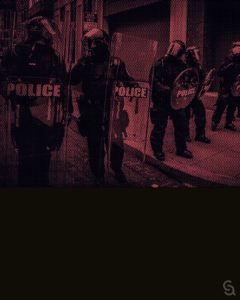
Editor’s Note: As 2018 draws to a close, we are posting CSA staff selections of the most memorable articles of this year. Today’s selection was chosen by Elrena Evans, Editor and Content Strategist for CSA.
Elrena writes: “When I look at the world in which I’m raising my children, I often feel hopeless. Reading Charles Howard gives me hope. His writing, so rich in imagery and feeling, makes me believe people can be inspired to join his call that ‘Simply remembering the March on Washington isn’t enough.'”
“I want Jesus to walk with me…”
A sister’s brave alto solemnly washes over our heads from within the midst of our procession. The cool breeze on this hot Washington, DC day carries her words as she begins to sing louder, with a slight variation on the word “walk.”
“I want Jesus, to walk with me!”
Holding the pain of the immigration and border crisis, the tensions around the travel ban, the undying burden of racism in this country, and the overwhelming and seemingly endless chaos of the political moment, we all join in the haunting melody of the old spiritual:
“All along this tedious journey…I want Jesus to walk with me.”
We step slowly. Slow enough for those on canes to keep up. Slow enough for us to brace ourselves for our imminent arrests. Slow enough to feel the ghosts of past, good-troublemakers walking beside us.
Today, we walk the same stony road that they trod. Soon, we’ll face the same chastening rod.
*
Just an hour before, while getting off the train in Union Station, I touched the humble statue of A. Philip Randolph that greeted us there in the hallway. Then, walking by the Mall, I thought of Bayard’s strategizing, Ella’s training, and Mahalia’s gift of song which blessed this space fifty-five summers ago.
And passing his majestic monument which now stands as a peaceful convicting sentinel, I thought of Martin’s dream and his commitment to putting legs on his faith and walking towards fear and hate with love.
Our nation marches through another long, hot summer—the fifty-fifth since Randolph, Rustin, Baker, Jackson, and King marched on Washington. The full name of their efforts that day was, “The March on Washington for Jobs and Freedom.”
There will certainly be documentaries and specials on television commemorating the occasion. There will be tweets and posts and perhaps even gatherings. And Dr. King’s “I Have a Dream” speech will be (rightly) played over and over again. And all of this is good, especially when we are seeing the nightmare of hate and fear-based racism rear its head in both caught-on-tape incidents around the country and from elected officials who don’t even know that what they are tweeting, saying, or writing into policy is racist and discriminatory. That said, simply remembering the March on Washington isn’t enough.
Simply remembering the March on Washington isn’t enough.
When I was growing up I spent my summers at sleepaway sports camps. One of the potentially slightly exaggerated sports glory stories that I often tell my kids is about a basketball game we were playing against a rival camp during my last summer. I was tall for my age and I loved playing ball. During the first half I was torching these guys. But the ref (in my unbiased opinion) called four quick fouls on me in the third quarter. I sat myself down even though my coach/counselor wanted me to stay in. When my coach came over to me on the bench and asked me what I was doing, I said, “Man, that ref is pickin’ on me!”
I was the only Black player, and the largest player on the court that game. And in hindsight I do think he called fouls on me that he wasn’t calling on other players. Likewise, when I was fouled I didn’t get the calls. As someone who has refereed a lot of youth sports since then, many referees officiate certain players differently, either consciously or unconsciously, for a wide range of reasons. Sometimes it is in an effort to make it fun for all the athletes, thus the stronger players often get refed differently than the weaker ones. Other times a player might remind a ref of a kid they didn’t like when they were growing up, so that player is treated differently—intentionally or unintentionally. Likewise, unconscious bias and stereotypes that we hold about certain people groups can most certainly affect how they are treated on the court or field. Whether this ref didn’t like me because of my race, or he was trying to keep it competitive, or he just made some bad calls, I don’t know. I do know that I was mad and I didn’t want to play anymore.
My coach got right in my face and gave me a brief, but needed, pep talk: “I know it’s unfair. I see it. I’m mad, too. But don’t stop playing. Your team needs you out there. Get yourself back in that game.”
So I got myself back in that game.
*
We keep marching. Slowly. Nervously. I had risked arrest once before, but not in DC. Not at the White House. Not with media like this watching us. It’s easier for me to teach about discrimination; harder to fight against it and risk arrest. But as I heard Shane Claiborne once say, “We risk arrest to arrest the attention of society.” Martin did the same just weeks before the March on Washington during his Birmingham Campaign.
And so I keep marching in Washington. Dreaming yes, but also marching. Ahead of me is Rev. Dr. William Barber—pastor, prophet and leader in the Poor People’s Campaign (another such march that Martin was planning, just before he was killed). Barber walks cane in hand, Bible in heart, truth in mouth. I look over his shoulder. A crowd of tourists part. Not like the Red Sea, more like onlookers at a funeral procession. Police officers (some mounted on horseback, some dismounting motorcycles, some in cars, others who’ve been standing with displayed weapons all day), fall into positions they have had to take more and more in this season of demonstration and resistance.
We, too, take our positions. We line up in front of the White House, each holding signs of protest.
We hear voices sing out from those fellow demonstrators who are not risking arrest:
“Ain’t gonna let nobody turn me around, turn me around, turn me around. Ain’t gonna let nobody turn me around. Gonna keep on walkin’. Keep on talkin’. Marching on to freedom land.”
A different voice hits our ears. This voice is not sung, but instead is broadcast from the police car that has parked right in front of us. We’re told that we are in violation of both federal and DC codes, which prohibit us from demonstrating and not moving from this spot right in front of the White House. This is our first, and then our second, and then our third and final warning.
“If you do not leave the sidewalk immediately, you will be arrested.”
“Ain’t gonna let no handcuffs turn me around, turn me around turn me around…”
I’m not saying that all who are commemorating the March on Washington need to risk arrest. That isn’t everyone’s calling. Nor do we all have the privilege and flexibility to take time off from work, and afford the fines that come along with arrest. What I am saying is that we do need to do more than just listen to Martin speak and watch Eyes on the Prize.
We need to do more than just listen to Martin speak and watch Eyes on the Prize.
“Get yourself back in that game.”
It’s a lot easier to sit on the bench and complain. Harder to actually take the court. Whether it’s protesting and marching or not, consider what putting legs on your faith might look like. This is a better way to commemorate this most beautiful, iconic, and powerful moment in our nation’s history.
*
I look to my right and Barber pulls the large cross that hangs around his neck up to his lips and whispers a prayer. My Philadelphia brother Shane Claiborne looks upward in silent petition. Rev. Jim Wallis the Sojourner closes his eyes, and prays loud enough for all of us and for his God to hear. My eyes are closed and my thoughts move between praying and wondering what my wife and daughters will think. I then think of Martin, and the sisters and brothers in SNCC and the SCLC, and the NAACP, and the children of Birmingham and all who were arrested while marching against hate.
I look up and my eyes are drawn to a mother and a boy who spoke at the press conference we had right before our march. Their husband and father is a pastor who was detained by ICE and deported from our country earlier this year. They now live in sanctuary within the walls of a church as a family broken apart. I see the pain in this young man’s eyes.
King speaks from the past;
“This will be the day when all of God’s children will be able to sing with new meaning: ‘My country ’tis of thee, sweet land of liberty, of thee I sing. Land where my fathers died, land of the pilgrim’s pride, from every mountainside, let freedom ring!’”
I think about King and his two arms of love. The right arm fighting to bring about change, even as it was being bent around his back for arrest. The left arm constantly working for reconciliation and community-building, even with those who were on the opposite side of issues from him.
The officers come to arrest us one by one. I turn around and see the tall pillars of the White House and I make the sign of the cross. I am taken and handcuffed. The officers were all kind. Firm, but kind. And especially gentle with the older protesters. I thank the gentleman who guides me over to be processed. I offer to pray for him. This is King’s left hand.
The handcuffs cut into my tattooed wrist leaving another mark—this one I did not desire. I share a cell with my brother Rev. William Gipson, and two other demonstrators. We chat, trying to keep it loose and distract ourselves from claustrophobia. I think of Martin writing from the Birmingham jail. I think of all the sisters and brothers who look like me and are locked up far longer than the few hours I’d be spending in my cell. I think of all the other clergy and people of faith who walked the same path into cells after demonstrating the last couple of years. Risking arrest has become almost a sacrament for many of us. It is a powerful embodied act of faith, indeed. A powerful act of believing that change can happen. A powerful act of trusting in God.
The March on Washington was about more than just a dream. It was about action.
The March on Washington was about more than just a dream. It was about action. It was about love. I pray we all do more than just dream or complain. Until all are free at last, we will—we must—keep marching and risking arrest so that we might arrest the attention and hearts of our country.
 The Rev. Charles L. Howard, PhD is the University Chaplain at the University of Pennsylvania, his alma mater. Prior to his return to Penn, he served as a chaplain in hospice and hospital and as a street outreach worker to individuals experiencing homelessness in Philadelphia. His writing has been featured in such publications as Black Arts Quarterly, Black Theology: An International Journal, Daily Good, Urban Cusp, Sojourners Magazine, Christianity Today’s Leadership Journal, Chronicle of Higher Education, The Huffington Post, and Slate. He is the editor of The Souls of Poor Folk, which explored new ways of considering homelessness and poverty, The Awe and The Awful, a poetry collection and Lenten Devotional, Black Theology as Mass Movement, a call to theologians to expand the reach of their theological work, and Pond River Ocean Rain, a small book about going deeper with a big God. Chaz has taught in the College of Arts and Sciences and in the Graduate School of Education at Penn, as well as at The Lutheran Theological Seminary of Philadelphia. He shares life with his beloved wife, Dr. Lia C. Howard and their three daughters. He sees his vocational calling to be to work for a communal increase in joy, peace, justice and love.
The Rev. Charles L. Howard, PhD is the University Chaplain at the University of Pennsylvania, his alma mater. Prior to his return to Penn, he served as a chaplain in hospice and hospital and as a street outreach worker to individuals experiencing homelessness in Philadelphia. His writing has been featured in such publications as Black Arts Quarterly, Black Theology: An International Journal, Daily Good, Urban Cusp, Sojourners Magazine, Christianity Today’s Leadership Journal, Chronicle of Higher Education, The Huffington Post, and Slate. He is the editor of The Souls of Poor Folk, which explored new ways of considering homelessness and poverty, The Awe and The Awful, a poetry collection and Lenten Devotional, Black Theology as Mass Movement, a call to theologians to expand the reach of their theological work, and Pond River Ocean Rain, a small book about going deeper with a big God. Chaz has taught in the College of Arts and Sciences and in the Graduate School of Education at Penn, as well as at The Lutheran Theological Seminary of Philadelphia. He shares life with his beloved wife, Dr. Lia C. Howard and their three daughters. He sees his vocational calling to be to work for a communal increase in joy, peace, justice and love.


